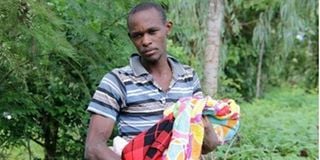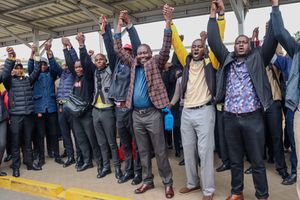Haunted by wife’s last words, widower, 26, seeks help to raise newborn

Isaac Ndung’u rocks his three-week-old baby on April 5. His wife died while giving birth at Maragua Level Four Hospital on March 16.
Isaac Ndung’u tearfully remembers how his wife Carolyne Wanjiku, 23, died while giving birth at Maragua Level Four Hospital on March 16.
“Babe, just briefly, and I will come back with our baby girl. Keep safe and be there to receive me,” he recalls the last words that were accompanied by a hug and a peck as she left for the ward.
He says the next encounter he had with his wife was “a motionless cold body at the mortuary”.
The baby girl survived the CS delivery and the death has raised many questions the hospital is yet to fully address.
“This was the saddest day of my life. My wife and daughter never saw each other. The mother died as our daughter was coming into the world,” Mr Ndung’u says.
The 26-year-old labourer says it will take years to recover from the shock.
“Here I am, with an infant to bring up, a wife to bury and the loneliness of widowhood. The devil has no mercy,” he tells the Sunday Nation at his Maria-ini home in Kandara Constituency, Murang’a County, adding that the daily budget for the baby is about Sh80.
Mr Ndung’u makes Sh300 on a “good” week.
“The total budget of the family for a day is about Sh120. My wife used to prepare chapati for sale and would earn Sh100 daily. Unless some well-wishers come my way, I am in for rough times,” he says.
Ndung’u says he married Wanjiku “to escape loneliness and the temptation of multiple relationships”.
“It will be difficult to get into a relationship with another woman. Transferring my love from her to someone else is not an option for now. Even in death, Wanjiku remains my soul mate,” he says.
Mr Ndung’u says he has 1,000 unanswered questions on his wife’s death “but as a poor man, I leave everything to God”.
To Mr Ndung’u, spending a lot of time looking for answers from the hospital would only lead to more mental anguish “instead of focusing on the task ahead of ensuring I become the best mother and father of my two children”.
He says he has not been given a proper explanation about his wife’s death but was told it was either an overdose of something in the surgery or the use of a sedative already removed from practice.
“The hospital advised us to forgo the post-mortem because it was expensive,” he says.
Mr Ndung’u started courting Wanjiku in 2018.
Before they made the decision on getting married, she conceived and gave birth to a boy. Wanjiku, however, remained at her parents’ home.
“We had been married for a year when she got pregnant the second time,” he says.
Mr Ndung’u adds that the hospital volunteered to nurse the infant for six months but his relatives could hear none of that.
“There is bad blood between my relatives and friends on one hand and the hospital on the other. My wife’s death created a lot of suspicion. We were disturbed to hear the hospital management insisting on taking care of the baby,” he says.
The standoff resulted in Maragua Assistant County Commissioner Joshua Okello forming an arbitration team that he chaired.
“The committee had representatives from Wanjiku’s family, the widower side, the hospital and government officials. The issue was ensuring the baby’s interests are taken care of,” Mr Okello tells the Sunday Nation.
“It was decided that since the father was known, the baby would be handed to him after training on nursing basics”.
Mr Okello says the father was also told to appoint a family member who would be shown how to take care of the baby.
“Mr Ndung’u appointed his sister. The training was easy as she is a mother already. The tricky bit was how to mix powder milk ratios, the administration of supplements and observing clinic schedules,” he says.
Mr Okello adds that the death was not conclusively discussed since there was no post-mortem and the family is yet to lodge a complaint with relevant authorities.
He says Mr Ndung’u and his relatives can pursue the matter through the Kenya Medical Practitioners and Dentists Board.
The widower says the relatives who represented him in the mediation committee demanded a comprehensive report from the hospital.
“We requested an explanation in the form of a recorded document but were informed that it was still being compiled. Mr Okello told us he would ensure it is copied to me once complete. I am still waiting,” he says.
The administrator says most of the family members were of the opinion that the “focus be on bringing up the baby”.
He adds that he briefed the Murang’a South Sub County Security Committee on the issue “classified as of great public interest”.
Maragua Level Four Medical Superintendent, Kairo Kimende, says the death was regrettable and that a report would be made to the family soon.
“The report can only be released on request by the next of kin or to the Medical Board. It is the standard procedure,” he says.
“Due diligence was observed. Compared to the bulk of success reports on similar operations, the incident is isolated,” Dr Kimende says.
According to the medical superintendent, the hospital is compassionate as it continues to play a critical role in nursing the infant.
Mr Okello presided over an event of handing Mr Ndung’u his baby at the hospital grounds on March 29.
“It was the start of my nightmare. The first thing my baby, who is named after my mother, did was cry. I also cried and so did everyone present,” the young widower says.
The administrator promised to reach out to area leaders to help Mr Ndung’u.
“As I left the hospital with the baby strapped on my chest with a shawl, my mother had the delivery items Wanjiku had checked in with. My mother-in-law was carrying my firstborn. I felt like a man on a journey to nowhere,” Mr Ndung’u says.
However, he says, he will face the situation “like a man” and do all he can to raise his daughter.
Mr Ndung’u says he attained a C- (minus) grade in his Form Four examination but did not train further his education as his family could not afford it.
“I have heard that the devolved government is giving Sh6,000 to any woman who gives birth. I should also be considered,” he says.
Sub-County Security Committee chairman, Gitonga Murungi told the Sunday Nation that Ndung’u’s situation has been categorised as urgent.
“I will contact the widower and his family. As a government, we owe him that help,” Mr Murungi says.
“We are following up on the plight of the child and the father, encouraging charities to come to the family’s aid.”
Mr Ndung’u says by the time his baby weans, the budget would have hit the roof as he may hire a nanny, and increase the number of diapers, powdered milk and clothing.
“Even as I wrestle with the challenges, I am still open to charity,” he says.





